Late Fall viewing: Oh, the horror!
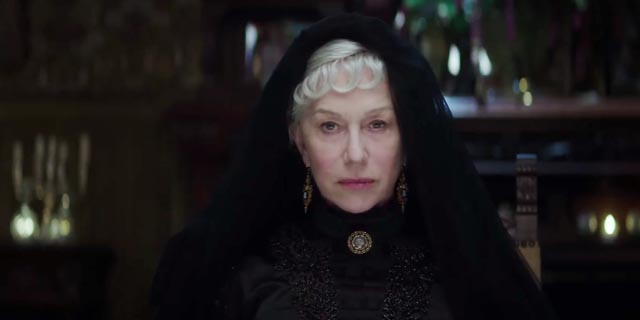
Horror as a genre has been around almost since the beginning of cinema and after more than a century it’s not surprising that horror movies have become excessively self-aware and referential. It’s hard to come up with new ideas, so what’s left is to play variations on a familiar set of themes. A lot of modern horror movies rely heavily on jump scares; these are effective in the moment, but by themselves don’t create any lingering effect. It’s more difficult to produce an unsettling atmosphere which gets under the viewer’s skin and grows there, creating a creeping dis-ease which at least for a while may cause a shift in how one perceives the world.
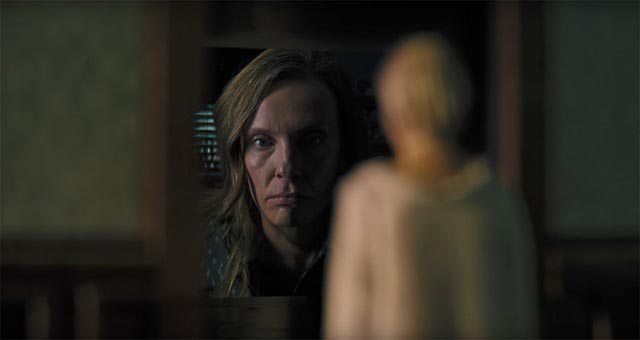
Hereditary (Ari Aster, 2018)
Going by the initial reviews, first time feature writer-director Ari Aster had cracked the formula. Hereditary was hailed as the best horror movie in years, a work of depth and power. I didn’t see it in a theatre, and my expectations were shaped by the conflicting opinions of friends – one thought it was a really effective horror movie, another thought it went totally off the rails and became ridiculous. By the time I watched it on Blu-ray, I’d been given enough hints to know where the story eventually went, so I didn’t suffer any shock when it takes a decisive turn towards the supernatural. In fact, knowing where it was going, I could see how Aster was planting clues in the first half.
But I could also entirely understand my friend’s negative opinion because that first half is such an emotionally and psychologically rich depiction of a family being torn to pieces by grief and guilt that the emergence of the supernatural theme does seem like a bit of a betrayal, a trivialization. The final revelation with its obvious echoes of Rosemary’s Baby and The Omen refers to genre while the earlier depiction of the family is painfully real.
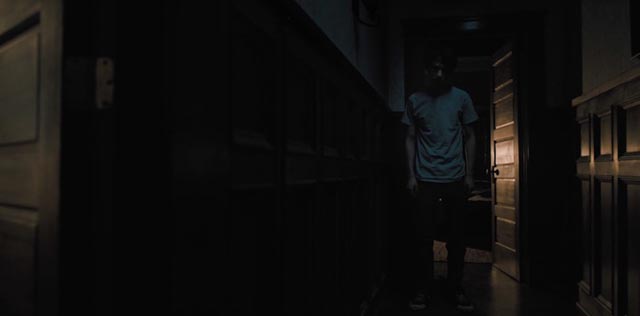
But despite the distorting effect of genre on the narrative, in its individual scenes and moments Hereditary has great power. Aster’s writing and directing are observant and assured, and he gets excellent performances from his cast. Although Toni Collette is far from likeable as the mother, her performance is harrowing in the depth of the pain she expresses; Gabriel Byrne is no less convincing, though perhaps less noticeable as the increasingly withdrawn father. Milly Shapiro is unsettling as daughter Charlie, while Alex Wolff manages to hold his own while shouldering much of the film’s implausible burden as brooding teenage son Peter – traumatized at the halfway point by an incident which could be seen as either a shocking surprise or a ridiculous contrivance – who ultimately submits to his preordained fate. (That incident was the reason one friend concluded that the movie was nonsense.)
Although the ecstatic reviews seem a bit overblown, I liked the film … but wished that Aster had had the confidence to tell the story without needing the genre props.
(Elevation Pictures Blu-ray: standard promotional featurette, 15-minutes of deleted scenes, and a gallery of images of the miniatures which play a powerful part in the film’s narrative.)
*
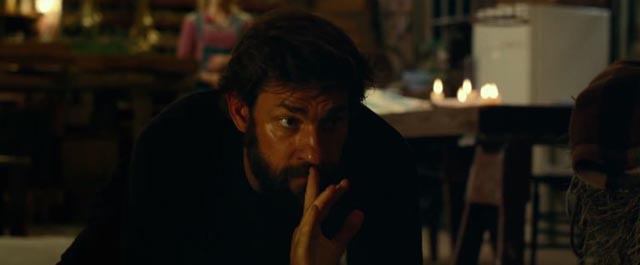
A Quiet Place (John Krasinski, 2018)
John Krasinski’s A Quiet Place is also the story of a family under stress, but it puts the genre elements right up front – although it doesn’t explain them. We get no background (is this our world in the future, a parallel world?), but are immediately introduced to a family – Mom and Dad, adolescent son and deaf daughter, and four-year-old son – as they scavenge in an abandoned store located in an empty, desolate town. They’re being very careful not to make any noise. The little boy is less conscious of the need for silence and when they leave, he’s sneaked a toy spaceship inside his jacket; lagging behind a bit, he takes it out and starts playing with it, flicking a switch which produces a sudden noise. The others turn back, panicked, and the Dad starts running towards the boy … but he’s too late. Something rushes out of the woods and snatches him away.
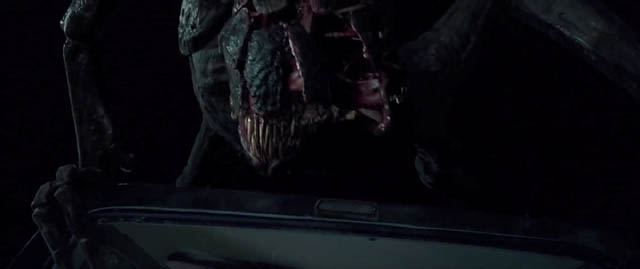
It turns out that in this world there are monsters which are attracted by sounds. We never know what these monsters are or where they came from, but the few human survivors have to live in complete silence to avoid being eaten. The family live on a farm with a safe room under the barn … which is very much needed as Mom is pregnant and nearing term. The guilt and grief they feel for the loss of the boy adds stress to the situation. The monsters increasingly encroach on their lives.
The narrative is focused on the details of lives lived under constant fear and Krasinski generates a lot of tension, but this dissipates in the back end because the script never gives us anything more than it did at the beginning … other than a “revelation” which is the least satisfying since the family in M. Night Shyamalan’s Signs discovers that the aliens can be defeated with water. Here, the deaf daughter figures out that – wait for it – these creatures with hypersensitive hearing can be adversely affected by loud noises.
A Quiet Place is nicely shot by Danish cinematographer Charlotte Bruus Christensen and the creatures are fairly impressive (effects by ILM); and the cast is good, with Krasinski and Emily Blunt as the parents and Millicent Simmonds and Noah Jupe as the kids.
(Dual-format Paramount release, with three featurettes – on the production, the sound design and the effects.)
*
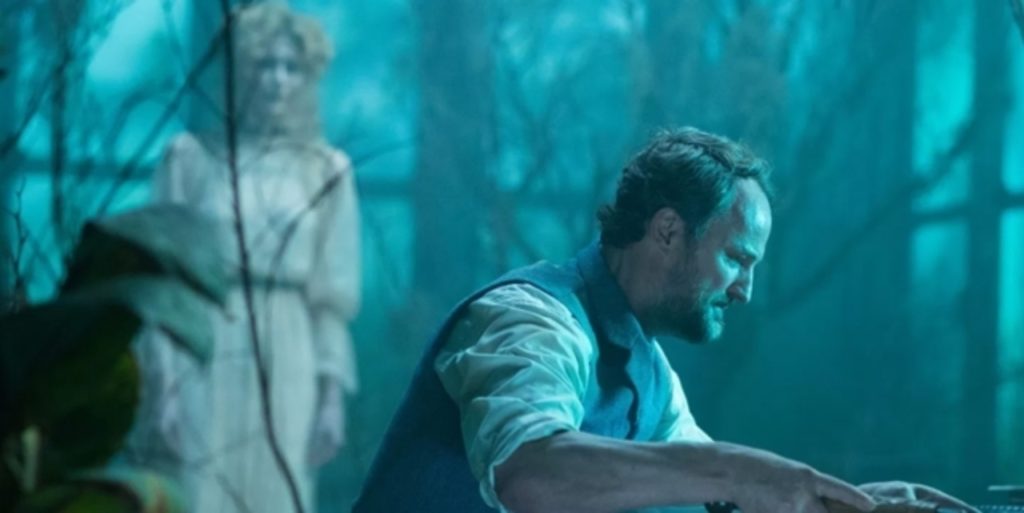
One of the interesting things about imagination and our capacity to tell and listen to stories is that we have the ability to invest fully in narratives which revolve around things in which we have no intellectual belief. I don’t believe in gods and demons, angels and imps, yet I do enjoy supernatural horror stories and movies as much as serious (and more plausible) science fiction. Something doesn’t have to be real to frighten us – and from a very early age, many of us like to be frightened, not by real things, but by fantasy. It’s a safe way to come to terms with a world which we can only ever partially know.
Strange then that more and more often, horror films these days tell us that they are “based on true events”, as if their makers fear our rational tendency to scoff at the supernatural. But reason has little if anything to do with our scary pleasures. Despite all our technological advancements, we all retain primitive structures in our brains which are hard-wired to fear what we don’t fully comprehend. (A fact which too many politicians make use of in their determination to obtain and cling to power).
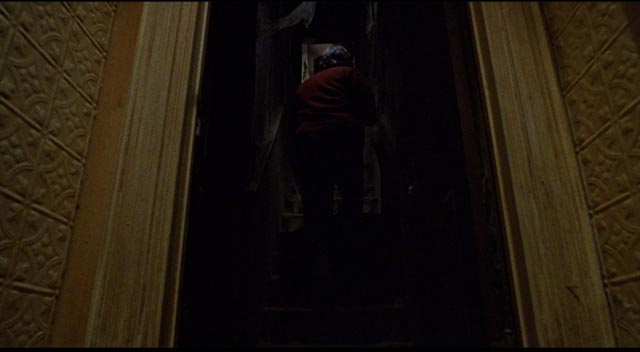
No doubt because I have no religious beliefs, I also don’t believe in ghosts and survival after death; nonetheless, I enjoy a good ghost story as much as a good demon possession tale. And yet many stories, books and movies about hauntings lay claim to be “true”. In terms of narrative, this is an unnecessary bit of gilding; the symbolic value of ghost stories has traditionally been as a means of unearthing past bad deeds and seeking to atone for guilt. Ghosts linger because important things have been left unresolved. They are manifest expressions of characters’ emotions, and as such don’t need to be “objectively real”.
Two very effective ghost movies I’ve watched recently (one a classic of the genre, the other a new release) both claim a basis in fact and both centre on crimes which need to be atoned for – one a hidden family secret, the other much larger and more widely known.
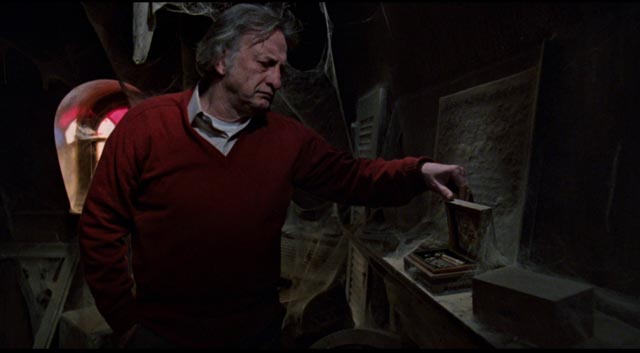
The Changeling (Peter Medak, 1980)
Although The Changeling (1980) won best Canadian film of the year, its national identity is all but invisible. A high point of the tax shelter years, it was produced by Garth Drabinsky and co-executive produced by Andrew J. Vajna (like director Peter Medak, a Hungarian who escaped the Russian invasion of 1956 and fled to the West, in his case to Canada). The script was not written by Canadians; the DoP was Brit John Coquillon; the stars were Americans; and locations in and around Vancouver were disguised as New York and Seattle. But all of that is ultimately irrelevant to the film itself, which is an atmospheric ghost story which comes close to the stature of Jack Clayton’s The Innocents (1961) and Robert Wise’s The Haunting (1963).
After a prologue in which composer John Russell (George C. Scott) watches helplessly as his wife and daughter are killed on an icy mountain road in upstate New York, the story moves to Seattle where he’s taken up a teaching post. He rents a huge old mansion from the local historical society where, surrounded by old things, he begins to compose again. But needless to say, there’s a restless spirit in the house and Russell’s life is turned upside down as this unseen entity becomes more insistent in its demands for his attention.
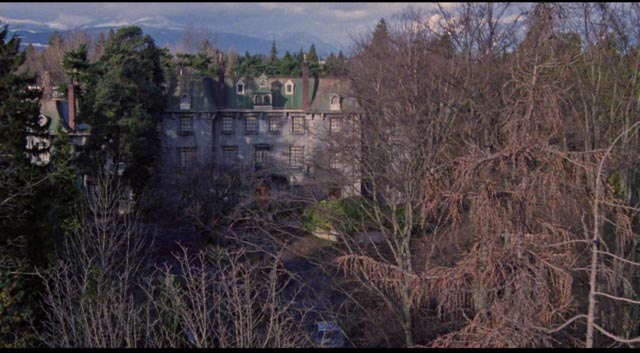
In classic ghost story style, Russell’s emotional vulnerability and lingering grief make him susceptible to communications from beyond – all amplified by an effectively staged seance. The story which is eventually exposed is a grim account of child abuse and murder, and the substitution of another child to conceal the crime. That changeling, now elderly, is a powerful politician who doesn’t take kindly to Russell digging into his past. By channeling his own grief into exposing this long-ago crime, Russell can possibly heal himself and bring peace to the wronged dead child …
Peter Medak, a Hungarian ex-pat who settled in England, had worked his way up through the studio system there for a decade before turning to directing, making three notable black comedies in four years with Negatives (1968), The Ruling Class and A Day in the Death of Joe Egg (both 1972). From then on, bouncing from features to television and back, Medak’s work became uneven until The Changeling gave him an opportunity to immerse himself in a fine piece of genre work (which, at the time, was dismissed by some critics for that very reason).
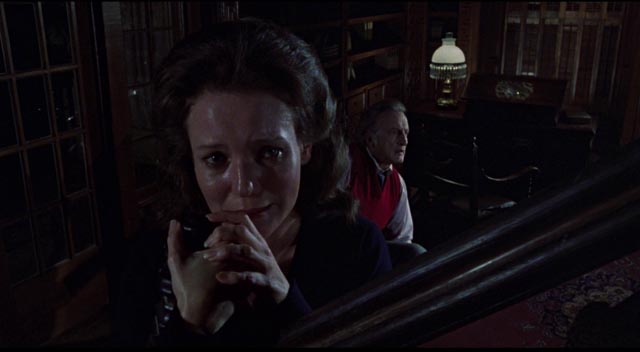
But it didn’t revive his theatrical career; the following decade was devoted to episodic television (with one poorly received feature), before he suddenly bounced back with a pair of excellent British period crime films – The Krays (1990), Let Him Have It (1991) –and to a lesser degree the overdone neo-noir of Romeo Is Bleeding (1993); but then he faltered again and returned to television, emerging once more for the embarrassing and unnecessary Species II (1998).
It’s never clear why careers veer off track like this, other than that the commercial film industry sometimes can’t accommodate genuine talents which don’t quite fit into a standard niche. Medak’s strongest work has been his English films with their outsider’s attention to details of class and social behaviour. That aspect had no place in The Changeling, which in many ways is the most conventional feature he’s ever made; but he committed fully to the project and invested it with all the craft at his disposal, honouring the conventions of the genre while drawing excellent performances from Scott and Melvin Douglas and never flinching from the grim horror of the crime at the story’s heart.
(Severin special edition Blu-ray: commentary by Medak and co-producer Joel B. Michaels, moderated by David Gregory; featurettes on the music and production design, another on the film’s locations, and a brief interview with Mick Garris about the film and Medak; and finally a featurette on the story behind the film – an account of a haunting in Denver by the ghost of a child similarly abused and replaced for financial reasons with a “changeling”, uncovered by a former CBS musical arranger who rented the house, discovered the hidden attic room and held a seance which revealed the story.)
*
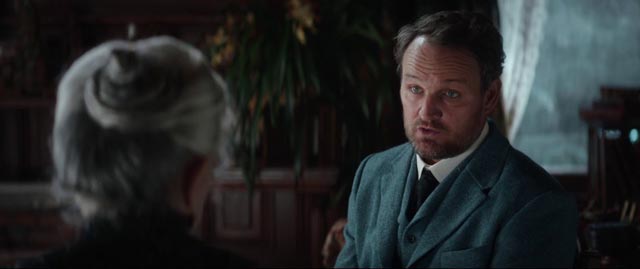
Winchester (The Spierig Brothers, 2018)
The house at the centre of Winchester (2018) is even more imposing than The Changeling’s old mansion. Construction on the Winchester Mystery House was begun in 1884 and continued non-stop until the death of Sarah Winchester in September 1922. Sarah, the widow of William Winchester, inherited a massive fortune and part ownership of the Winchester Rifle Company which gave her an equally massive income for the rest of her life. The sprawling building she commissioned in San Jose, California, was continuously revised and added to over decades, the numerous rooms reputed to be occupied by the ghosts of those killed by the company’s product.
In the film, Dr. Eric Price (Jason Clarke), an alcoholic psychologist, is hired by the company board of directors to evaluate Sarah’s sanity in an attempt to wrest control of the company away from her. The old lady (played with regal authority by Helen Mirren) intrigues him; she seems strong and self-assured, yet completely convinced about the presence of the ghosts. Naturally, they do turn out to be real – with some of them not surprisingly bitter and angry about their violent deaths.
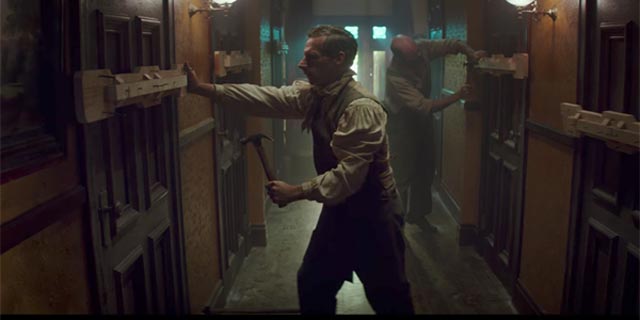
As Price digs deeper, one ghost in particular becomes more dangerously assertive; a young Southerner named Ben Block (Eamon Farren) lost all his brothers during the Civil War to superior Northern fire power and died himself when he entered the offices of the company and slaughtered the employees before being killed by the authorities. Now he’s in the house and seeking revenge on Sarah.
The house itself is a terrific setting for the story, its multiple interlocking rooms constantly being modified and frequently sealed to keep angry spirits in check. Mirren’s Sarah is an initially off-putting but ultimately engaging and sympathetic character. The supporting cast (largely Australian) is excellent, and the atmosphere of menace is well-sustained, with a sufficient number of jump scares salted throughout the film to make it satisfyingly spooky.
This is the latest feature of the Spierig Brothers, Michael and Peter – born in Germany, but transplanted to Australia. They began their joint feature career in 2003 with the horror-comedy misfire Undead, but redeemed themselves nicely with the underrated Daybreakers (2009) and Predestination (2014), a terrific adaptation of Robert Heinlein’s 1958 time travel story “All You Zombies”. They arrived at this relatively lush period ghost story after a detour into sequel-land with Jigsaw in 2017. Hopefully the relatively quick appearance of Winchester after that indicates that their output will increase – they have an obvious talent for playing creatively with genre conventions.
(VVS Films Blu-ray: with a decent 22-minute making-of featurette.)
Comments